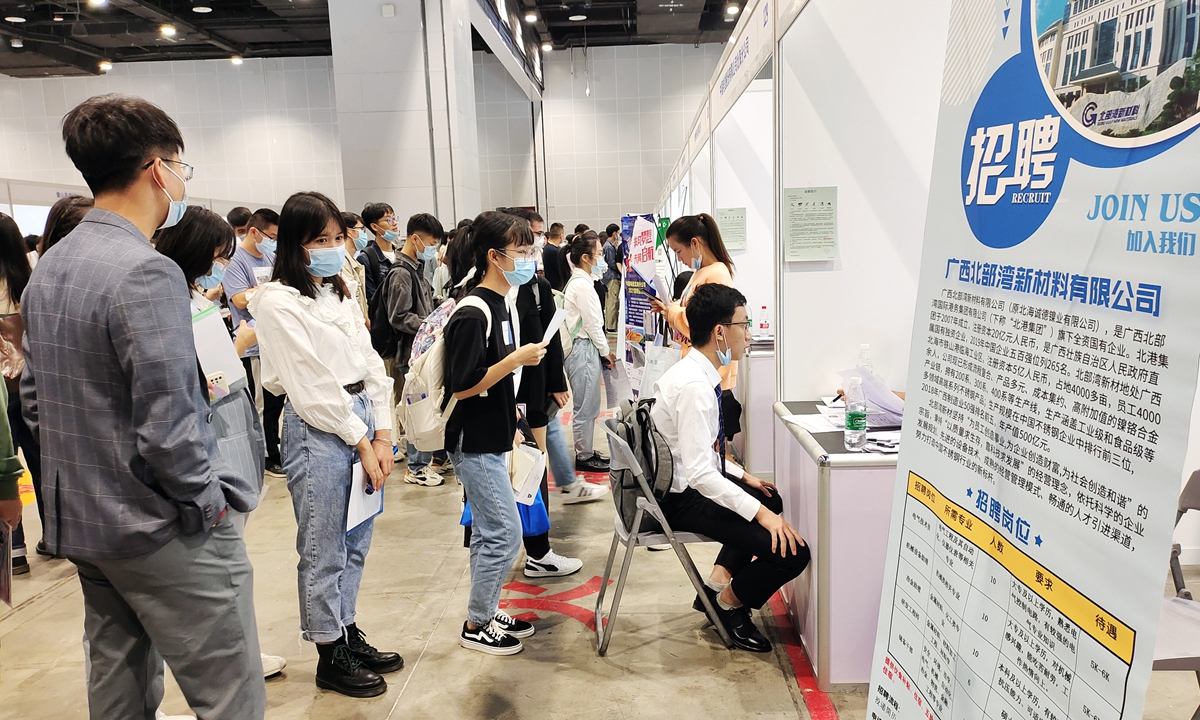
A recruitment fair for college graduates for 2021 is held in South China's Guangxi Zhuang Autonomous Region. At the fair, 350 companies offered 16,000 jobs to upcoming graduates. Photo: cnsphoto
Get a job, pursue a master's degree or take a civil servant exam…? An unprecedented 10.76 million graduates are expected to apply their wits to find a way to start work in the face of multiple pressures posed by the COVID-19 epidemic and structural contradictions in the China's labor market.
The graduates of 2022 face multiple employment pressures, and job-hunting is even more difficult than in 2020 at the early stage of the pandemic, China's Ministry of Education said recently. Some 10.76 million students are about to leave campus this summer, an increase of 1.67 million year-on-year, hitting a new record high.
Experts said graduates are tending toward "stable" opportunities, either the civil service, state-owned-enterprises (SOEs), or going on to higher degrees amid the competitive job market. The labor market is complicated by lower demand for workers, pandemic restrictions, prominent structural contradictions and mounting anxiety among graduates.
Experts urged young students to plan their careers to increase their competitiveness, noting that "lying flat" is not a good option. Also, they called for more preferential policies to expand the intensely competitive job market.
Yang, a doctoral student from Renmin University of China who is under pressure to find a proper job, told the Global Times that she is competing with more doctoral students, as many who should have graduated last year but were held up by the COVID-19 pandemic also joined the job market this year.
As graduation approaches, Yang spends a lot of time looking for opportunities from any source.
Like many other students, Li, a student from Capital Normal University majoring in Chinese Language and Literature, is opting to pursue a master's degree to evade the so-called worst job-hunting season on record.
"I feel like everyone close to me is preparing for a postgraduate entrance exam… it's hard not to be influenced by classmates. A master's degree is like the basic threshold for being a teacher, which is relatively stable amid the epidemic," Li said.
To be more competitive, about 11 percent of postgraduates aim to pursue doctoral studies, significantly higher than the 4.3 percent in 2021, data revealed by Chinese online recruitment services provider
Zhilian Recruitment sent to the Global Times showed.
Some others are choosing to become grassroots civil servants or community workers, a group of people who have been playing a key role as China deals with the pandemic with a dynamic zero-case policy. Experts call for better policies for these occupations, such as higher salaries, to attract more graduates.
Data compiled by Zhilian Recruitment showed that the civil service or SOEs are the main choices of many Chinese graduates, indicating a trend to seek stability. Compared with private companies, some 44 percent of graduates prefer a job at a SOE, up from 42.5 percent in 2021.
Occupational choices for young Chinese are becoming more diverse along with the emergence of new industries in China such as e-sports players, online anchors for living-streaming industry and online writers - and even deliverymen, experts said.
Jiao, who returned from Beijing to his hometown in Shandong Province and now is an entrepreneur using live-streaming, told the Global Times that great opportunity still exists in the industry, which has become more well-regulated. He recommends it as a job choice for young graduates who want to be entrepreneurs.
Among the 10 million graduates, only half want to work for employers, which is a lower level than in previous years. The proportion opting for self-employment increased to about 18.6 percent, Zhilian Recruitment data showed.
In the face of recruitment pressure for graduates, universities or local governments did not sit idle.
Yang's university posts recruitment information on its website or to its WeChat groups for grads. A seminar on recruitment has also been held to solve problems students encounter during job seeking.
A young teacher surnamed Wang from a university in East China's Fujian Province told the Global Times his university had coordinated with enterprises under an internship program. Wuhan Technology and Business University even set up a training class for its 40 graduates in a bid to help them job hunt.
Hainan provincial government will award 2,000 yuan ($305) to companies that recruit graduates who have failed to find jobs within two years of leaving campus. It will offer 10,000 yuan as a subsidy for graduates who start a business.
To fundamentally relieve employment pressure, though, China should further develop economy and provide policies to expand the job market or encourage entrepreneurship, Li Changan, a professor of the Academy of China Open Economy Studies at the University of International Business and Economics, told the Global Times.
Graduates who want stability in choosing civil service, public sector and SOE jobs is normal in the face of repeated epidemic outbreaks and structural contradictions in the employment market, as is mounting anxiety among graduates. But it's not the way out, as the scale of the civil service or SOEs cannot expand indefinitely, Li noted.
"Lying flat" is not a healthy mindset in job hunting, Li said, calling on young graduates to plan their careers and make preparations to raise their competitiveness before blindly entering the job market.




